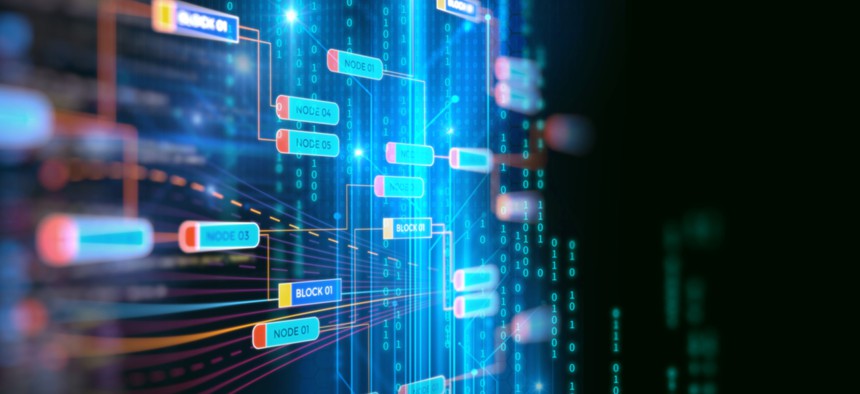What’s Blockchain’s Role In The Public Good?

whiteMocca/Shutterstock.com
A nonprofit partnership is looking for ways the decentralized ledger system can benefit society.
Some federal agencies are experimenting with Blockchain—the same decentralized ledger system that keeps a record of every Bitcoin transaction—as a means for tracking adjustments to certain documents.
The General Services Administration, for instance, is investigating using Blockchain as a piece of a pilot that aims to automate the process by which it reviews bids on federal contracts. GSA is also gathering ideas for other Blockchain pilots from federal leaders.
But at least one non-governmental group is investigating ways the ledger system could be used for a broader goal: ensuring that the public trusts their government.
The National Democratic Institute, a nonprofit focused on government transparency, is partnering with the New America Foundation and Bitfury, a Blockchain technology company, to pilot Blockchain projects that might benefit the public good. They call their collaboration the “Blockchain Trust Accelerator,” in which Bitfury develops the technology pro bono for various federal, state and local institutions, So far, it has worked with the Republic of Georgia and the United Kingdom.
The group was launched about a year ago, and it’s still looking for new pilots, Chris Doten, NDI’s chief innovation officer, told an audience at an ACT-IAC event Wednesday.
Globally, citizens have “trouble distinguishing between what’s real and what’s fake,” he said, “when people don’t believe necessarily in what their government does anymore.”
Advocates of Blockchain have argued that, when coded correctly, the ledger system prevents anyone from tampering with the record and automatically updates with every transaction, meaning that disparate parties who don’t trust each other can rely on the ledger’s integrity.
“We can build processes that are more secure and transparent, records and contracts that are more easily accessible and resistant to corruption,” Doten said. Such systems might potentially ensure people’s votes aren’t tampered with and are recorded properly, protect property deeds from being adjusted, or generally improve “maintaining the integrity of official records.”
In the country of Georgia, the accelerator has developed a property titling program that stores licenses in a Blockchain ledger. “If you have a particularly prime piece of property in the North Caucasus...if the brother of the registrar of deeds in Georgia decides he really wants a part of that, he can’t simply just go grab it from you because every single deed is actually linked to the Bitcoin Blockchain, in a way that makes any sort of transfers immediately obvious,” Doten said.
Doten said he was heading to Liberia to build out a notarization service that would track adjustments to electronic documents--for example, “election monitoring results that come out, such that people can’t take them, manipulate them, and push them back out in an explosive political atmosphere.”
But he warned Blockchain advocates to consider the dark side of expansive ledgering as they pitch projects to the accelerator.
“The disempowered tend to be even further isolated when new systems like this come into play,” he said. Women and linguistic minorities might not have the same access to technology as other parts of society, so creating a system that relies on specific products could put them at a greater disadvantage.
The accelerator is also thinking about what it means to have a “permanent, irrevocable record of every transaction that every takes place, that can often be tied back-- whether people think so or not-- to an individual,” Doten said. “We really have to think about the long-term privacy implications for all this stuff.”





